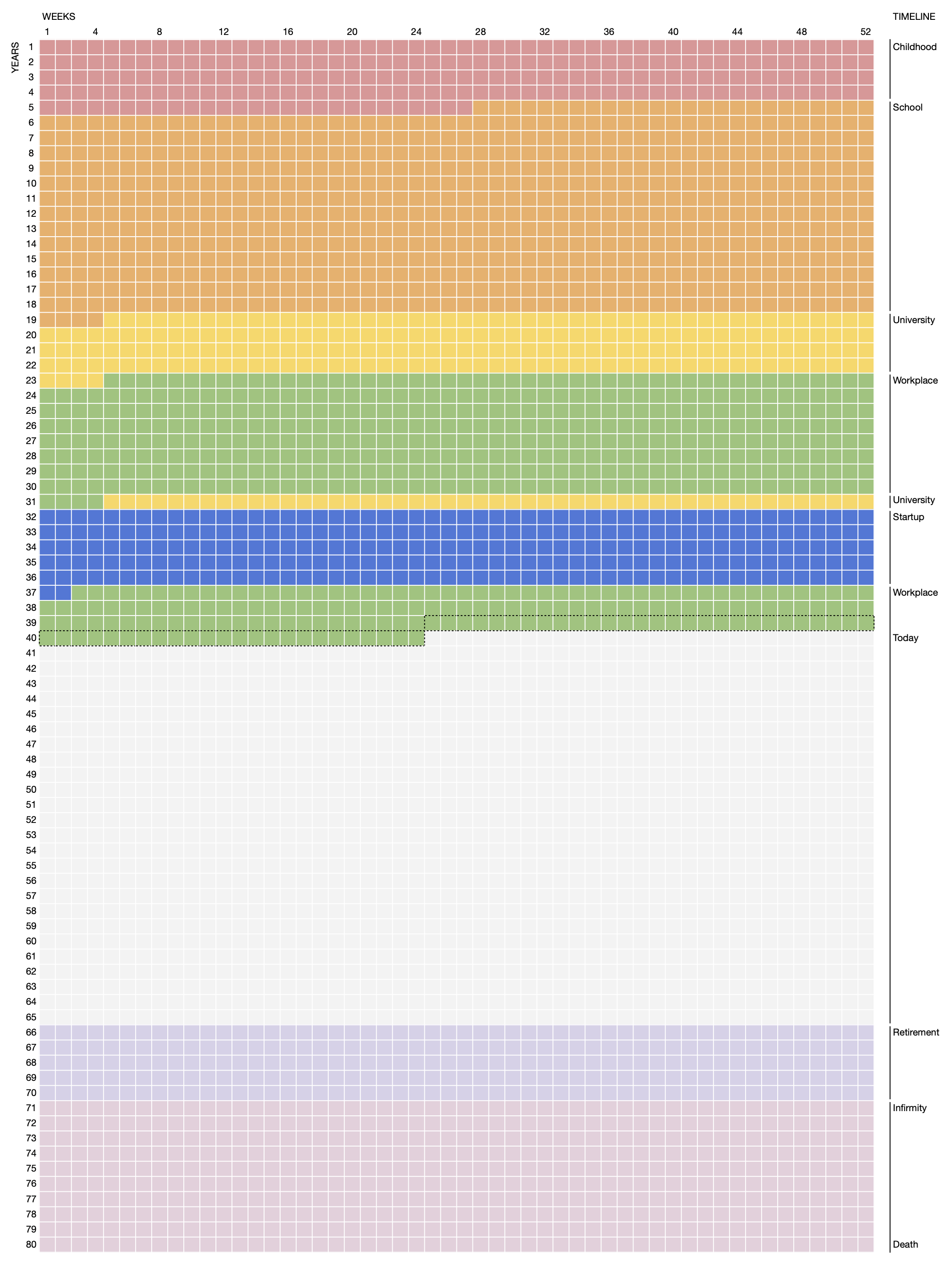As I write this, I’m about 7 months away from my 40th birthday. That milestone, numerologically important to inhabitants of our particular planet who happened to evolve 10 fingers upon which to count, will come a little past the halfway point of the average life expectancy of males from my country of birth.
We are a couple of days away from the start of 2025, and it seems like a suitable moment to reflect on the passage of life.
4,000 weeks
Back in 2022, I read Oliver Burkeman’s thought provoking book Four Thousand Weeks, named for the length of time that more or less corresponds with the average human lifetime. A worldview that acknowledges this surprisingly brief existence can be traced back to Roman stoicism - notably Seneca and Marcus Aurelius.
Fans of thinking about their own inevitable death sometimes create diagrams like this one:

This chart displays my life from birth, through to an expected death around 80 years old, with a few assumptions such as retirement at age 65. Each square is a week, each row is a year, and I have coloured it to indicate the major time demarcations of my life thus far. The current calendar year of 2024 is marked by a border, and as you can see lies around the midpoint.
Time moves fast and slow
The thin yellow sliver at row 31 represents my time studying Machine Learning at UCL. This period looks tiny on my diagram, but it looms large in my memory. In that year I switched careers, I studied a new field, and I found a new passion that led me into the world of AI. I also met my wife, and the co-founders of Datasine - my first startup that stands out in blue on the above chart. That little yellow line was a pivotal and momentous year.
In comparison, the first green slice (my time working for tech companies as an engineer) is more than 8 times the length, but now feels far less substantial in how I think of myself as a person.
The lesson is that 4,000 weeks can be a long time, or can be a short time. It is the meaning ascribed to each week that dictates the importance - not the length.
Age is biological
In recent years, I have become increasingly aware of the limitations placed upon us by biology. As my peers and I face both the aging of our own parents, our own growing awareness that we are not as young and fit as we used to be, and the shock of sudden severe illness and even death among our friends and colleagues, we start to think more seriously about our future health.
In the part of the diagram that is above, there are a handful of hospital visits - a couple of broken bones and sprained ankles, an emergency appendectomy near the end of row 24. Several rows in the school years with various medications for lung issues that variously pushed my weight up and down, affected my skin etc.
Despite this smattering of issues here and there, the reality is that 90% of my health problems are ahead of me. If I want to live my fullest life through the bottom half of this diagram, I need to start thinking more seriously about my physical health and wellbeing, and preserving the state that I am in as long as possible.
Life happens
I started writing this blog some way into row 29. It isn’t the first website I’ve kept, but I remember deciding to break with a past that had included vague aspirations towards journalism, creative writing and other pursuits. “I’ll write a tech blog!”, I thought, and so I did.
But over time, all that other messy stuff - life - kept creeping back in: sporadically voracious reading habits to be documented, music to be made in the dead of night and leaked out into dark corners of the internet, cryptic crosswords to nerd over, and much more besides.
This is part of a wider pattern across my life. As I have got older, I have also got fuzzier. I can’t think of a better way of describing it. I have let the partitioned parts of my life blend and overlap in a way that when younger I would have found frankly embarrassing. Is this what acceptance is - a letting go of your ability to control the separation between the parts of your life that you try to optimise separately?
Even the choice of colour coding above feels increasingly arbitrary and artificial. Why demarcate a life through jobs and education? Why not relationships, or books read, or recipes learned, or jokes told?
At the top of the hill
I really don’t like the phrase “over the hill”. It is usually quite disparaging, implying a decline that has set in to the point at which a person’s actions are of little importance.
Nonetheless, I find myself feeling the urge to acknowledge that I am likely currently standing at the top of the hill - in the best possible position dispassionately to survey all the terrain I have covered so far, and to look ahead and see where the road might lead as I start my descent down the second half of my 4,000 weeks.
I believe that this is an urge I should resist. Does the second half of my life just involve winding my way down into the valley, trying not to stumble, tipping my cap to others travelling past me on their way to the summit? I certainly hope not.
My belief is that the second half of that diagram contains greater summits to scale. To reach them, and make the most of my remaining 2,000 weeks, I will need to be strong of body and of mind, more than a little bit lucky, and walking with my eyes fixed on the horizon.
